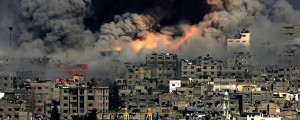Michael Brown , 18 was killed Saturday, in St. Louis, apparently shot by a bullet from a police officer’s gun. The FBI will investigate this as a possible civil rights violation. It is front-page news across the country.
A few hours later, Khalil Al-Anati was killed in Hebron, apparently shot by a bullet from an Israeli soldier’s gun who may have been shooting into a crowd of protesters throwing stones. The Israeli military police is investigating. The story is buried in the inner pages of the newspapers that bother to cover it.
The human rights organization B’Tselem requested inquiries for over 300 killings of Palestinians by Israeli forces between 2000 and 2011. This has resulted in 9 indictments. The vast majority of military inquiries are closed years later with no action taken and no comment on why they were closed.
Thousands of children as young as 9 have been arrested and harshly interrogated, often for no reason other than a relative of theirs is wanted.
In St. Louis there have been vigils and protests, and the entire country is riveted. Everyone is wondering whether Michael’s only mistake was being born black.
In the West Bank, hundreds attended the funeral, but there is no major protest. Perhaps because this is the 17th shooting of an unarmed civilian in the West Bank this month. This month has been particularly difficult. On average Israeli soldiers kill only one or two unarmed civilians in the West Bank. A pace has been steady for years except for the years where protests are thick. Some are killed because they stray too close to a fence, around a settlement or border with Israel. Some are killed because young Israeli soldiers in armored Hum-vees panic and shoot into or around a crowd of Palestinian teenagers throwing stones.
Maybe the Palestinians have run out of rage, because four hundred and thirty children have been killed in Gaza over the past four weeks.
Khalil Al-Anati was 12 years old. His mistake was playing outside his house while an Israeli military convoy drove past and someone else threw stones at them. Just another “human shield” meant to be smashed to smithereens.
Perhaps his real mistake was being born Palestinian.
